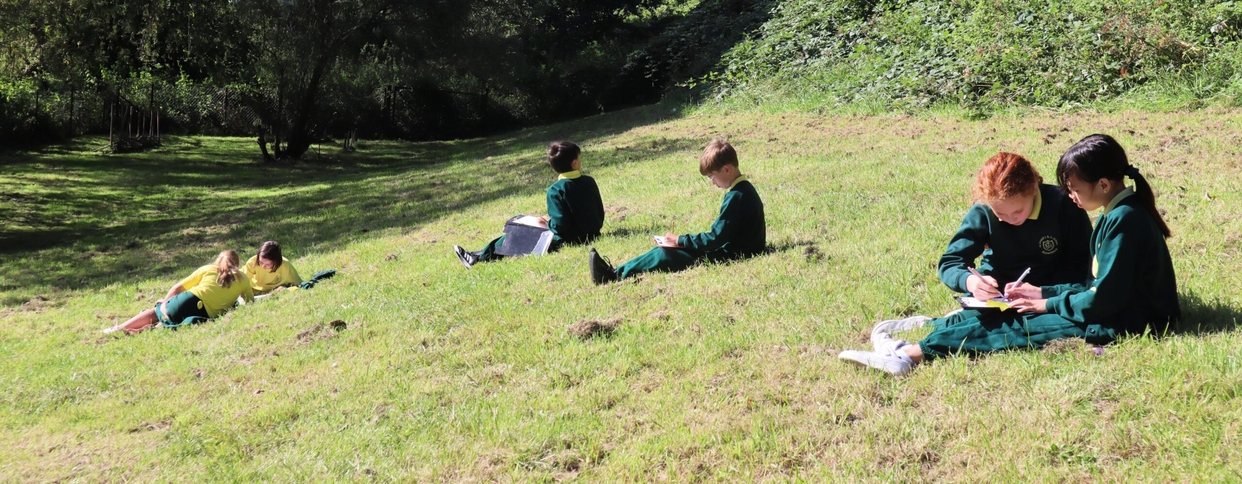St Joseph’s Catholic Primary School, Malmesbury
Our Curriculum Intent Statement
“Walking in the footsteps of Jesus, loving and serving together”
At St Joseph’s Catholic School, we provide a broad, balanced, creative and ambitious curriculum, which ensures our children are prepared for the next stages of their education and lives. We endeavor to enrich our children’s learning through a range of stimulating experiences. Our curriculum provides our pupils with the essential core knowledge and skills as directed by the 2014 National Curriculum. We aim to provide a curriculum which is enriching and challenging, where children experience the opportunity to learn in a wide range of contexts. Hence, our pupil engagement is high and there is a real buzz and positive attitudes to learning when walking into classrooms!
We aim to ensure that each and every child is prepared for life in modern Britain and to take their place in our modern world. As a Catholic school, the schools direction is driven from its Mission statement, “Walking in the footsteps of Jesus loving and serving together”, we provide a Catholic Christian education based on the life and teaching of Jesus Christ and draw upon Gospel Values which underpin all aspects of school life. In doing so, we aim to provide an environment in which the dignity of each person is recognised and developed; and to promote the full potential of each child through a curriculum which develops spiritual, academic, social and emotional growth.
At St Joseph’s we have developed a well thought out and systemic learning programme ensuring there is time and space in the school day and in each week, to gather components of knowledge and experiences beyond the curriculum specifications. The education offer we provide ensures each child’s cultural capital builds year on year sequentially.
The focus on making learning relevant and meaningful incorporates practical experiences for all our children, using both the local environment and further afield. The class teachers, alongside the Curriculum Leaders ensure there is clear progression of skills and opportunities for creativity, by planning from the National Curriculum Programmes of Study. Opportunities for depth of learning are planned by teachers and led by children’s prior knowledge through regular questioning and assessment.
Each topic begins with an exciting, stimulating experience. This may be an educational visit, a visiting speaker or an experience day where children discover and explore their new learning. Children are then challenged through a range of stimulating, exciting learning experiences to learn, develop, solve problems, apply themselves creatively and express their knowledge and understanding effectively across the curriculum.
We use our evaluations and assessments to continually update our curriculum maps, ensuring breadth and balance. Throughout the school year, we ensure that our children are kept up to date with current local and global news through special assemblies and whole school projects eg World War 1 centenary, World book day, Rainbow day. In addition to this we are constantly reflecting and demonstrating our values “walking in the footsteps of Jesus living and serving together” ensures that we promote children’s spiritual, moral, social and cultural development, enabling them to develop their own moral and ethical compass to guide what is right and what is wrong.
We actively promote fundamental British Values of democracy, individual liberty, mutual respect and tolerance of those from all faiths, backgrounds and cultures and the Equality Act. Furthermore, our programme of assemblies, PSHE curriculum and RE curriculum educate children on current events around the world and promote children’s spiritual, moral, social and cultural development.
When planning a curriculum, St. Joseph’s recognises the diverse backgrounds of our families. The school has a roll of Catholics (49%), yet remains almost full in all year groups (NOR 130) because the families in our school value the Christian education that is on offer for their children of other faiths or no other faith. We have a number of children for whom English is an additional language 9.35% *(13 children) and from a range of ethnic backgrounds.




